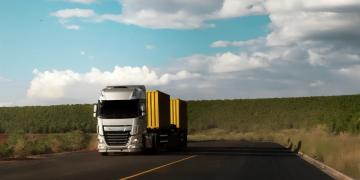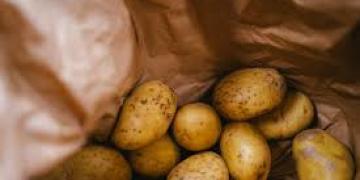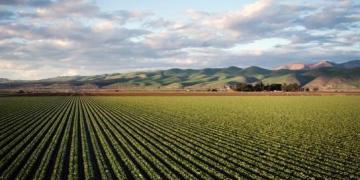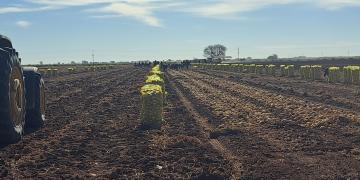Spain (Castile and León): Foreign potatoes flood the shelves in the country’s main producing community.
The shortage of domestic potatoes is leading to massive imports of the tuber.
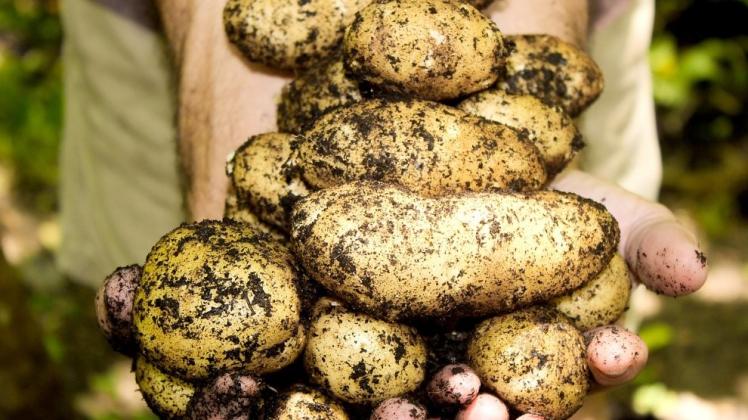
Last season, Castilla y León comfortably reaffirmed its title as Spain’s leading potato producer, with more than 17,000 hectares planted out of nearly 70,000 hectares nationwide. While the area fell by 1.9% in Spain, in Castilla y León it not only did not decrease, but actually increased by over 2%. Of the nearly two million tons produced nationwide, some 790,000 were "made in" Castilla y León, 40% of the total.
In this context, it is surprising that potatoes produced in other countries are "flooding" supermarket shelves in the Community, as reported by the Professional Agricultural Organizations (Opas). This market behavior could be considered normal at this time of year and under current conditions, where the lack of domestic production is making the tuber scarce.
The sector’s concern, as always, is that these imported potatoes, firstly, meet all the conditions required of Spanish producers, so that they don’t become unfair competition, and secondly, that as soon as the native potato is harvested, the countries from which it is currently imported don’t carve out a market niche that excludes Spanish producers. In fact, these days, as the new Spanish potato begins to emerge, the issue is beginning to worry agricultural professionals, although for now in other regions further south in Castile and León.
With these elements in mind, the OPAs have emerged in recent days to express their concern about the abundance of exotic potatoes on grocery shelves. The president of Asaja Castilla y León, Donaciano Dujo, points out, in response to this newspaper, that at this time, "the truth is that national production is scarce; there is no potato harvesting campaign throughout Spain," but only a start in the southern part. "In this context, just as we export all types of products to other countries and are the seventh largest exporter in the world, we also have to take into account the free market for these products," warns Dujo.
"Always, of course, as long as the production and sanitary conditions that we are required to meet are met. In that regard, when there isn’t any here, it has to be brought in from abroad." "The key is to ensure that the sanitary and production conditions required of us here are met, and that when there is any here, domestic production is given the utmost priority," he concludes.
The coordinator of the Peasants’ Union of Castile and León, Jesús Manuel González Palacín, points out that in Castile and León, the potato planting process is still in full swing, and that the first ones will begin to sprout "soon." "Yes, there’s still a long way to go before we start harvesting them," he observes. "We are a country with a potato deficit; we need to import them to cover our market, especially during these months when the first potatoes begin to be harvested in the most central areas of Andalusia and parts of Levante."
"It’s true that we need those potatoes, but what we do ask is, first, that they come with the phytosanitary requirements that are required of us, and second, that they come in the quantities we need so that our product doesn’t face unfair competition. Those potatoes have completely different regulations than ours," Palacín explains.
"They’re potatoes of lower quality, because if you do a phytosanitary analysis or a residue analysis, they wouldn’t comply with European regulations," the UCCL coordinator emphasizes. "Therefore, people need to identify them properly and know that they’re potatoes of different quality. But even so, we have to recognize that if we can’t supply the market, they have to enter so as not to run out of supplies. But, I insist, a huge effort would have to be made to differentiate these potatoes, so that people, when they buy them and take them home, should know that they don’t comply with European Union phytosanitary regulations, that they contain residues that are prohibited here."
From Egypt
"These are potatoes that come from Egypt and Israel, and they certainly don’t comply with European regulations or the regulations here." For now, the arrival of this tuber isn’t harming producers in Castilla y León, because "the most serious damage it can do to us here is when we start harvesting potatoes here, in June or July, more precisely mid-July," explains Palacín. "And we have to be very vigilant so that the potatoes coming from abroad are, first, perfectly identified, and, second, carry out a very strong promotional campaign so that consumers are able to distinguish between potatoes produced here, under very important and very strict quality parameters, and potatoes that come from abroad, which don’t comply with European regulations and which, it’s true, may even be prettier, whiter, and more visually appealing, but which, of course, have residues that would be prohibited here."
Regarding the campaign forecast and price trends, the UCCL coordinator points out that right now, "the new potatoes in supermarkets are at acceptable prices. Farmers, obviously, as always, are being paid considerably less, but the price we see on the shelves is not yet decisive. Much will depend on how the potato market ends up in Andalusia, Castilla de la Mancha, Valencia, Cartagena, Extremadura, and where we start to get our produce."
"If the campaign starts cleanly and the market is able to handle all the potatoes being harvested, if in Castilla y León we start harvesting without competition from other autonomous companies, and if we are able to stagger the harvest, there shouldn’t be any problems this year," says the takeover bid leader. "If this isn’t the case, there could be problems. Therefore, organizing the harvest this year will be crucial to whether the price remains stable or plummets."
The first to denounce the situation at the end of April was the Coordinator of Farmers and Ranchers Organizations (Coag), an agricultural organization that complained that while Spanish new potatoes "are beginning to emerge from the fields with all their freshness and quality," large retail chains "continue to flood the shelves with potatoes imported from Israel and Egypt (more than 80,000 tons in 2024)." This is "a calculated strategy to delay the purchase of domestic produce, saturate the market, and force down prices at source," according to sources from the takeover bid. At that initial stage, the organization is referring primarily to the shelves in southern Spain.
"The result is that consumers are forced to make the typical potato omelet with raw materials from the Middle East, while quality local produce is in the sacks. It’s unreasonable to find ’Israeli Origin’ potatoes in a commercial area of Campo de Cartagena, with 10,000 hectares planted," lamented Alberto Duque, COAG’s potato manager, last week.
The concern begins in the southern Spanish communities, but as the weeks go by, the same anxiety will shift north. Many potato producers in Castile and León haven’t even had the opportunity to plant their tubers yet, due to the heavy rains that have flooded the fields and made it impossible to import them. But as the harvesting date approaches, people will be more wary of foreign potatoes.
Sufficient supply
According to reports from Coag, the main producing areas currently harvesting new domestic potatoes (Seville, Malaga, and Campo de Cartagena) confirm that supply is currently sufficient to sustainably meet the demand of the main distribution chains.
"We don’t understand why native potatoes, with their quality seal and EU standards, are being sidelined on the shelves in the face of imports from third countries. Added to all this is the widespread presence of storage potatoes from France, which have been harvested since November and have already lost much of their organoleptic qualities after being stored in cold storage.
"We ask consumers to pay attention to the labeling and demand local new potatoes from supermarkets. It guarantees freshness, food safety, and the economic and social development of our communities," emphasizes Vicente Carrión, president of Coag Campo de Cartagena.
Coag warns that this strategy "endangers 4.2 million rural working days, while releasing an additional 3,376 tons of carbon dioxide into the atmosphere through international transport, the equivalent of the emissions from 10,683 round-trip flights per person on the Madrid-Paris route."
The organization has reported this issue to the Ministry of Agriculture, Fisheries and Food (MAPA) and to the agricultural departments of the most affected autonomous communities, while demanding that the purchasing managers of the main distribution chains "make a firm commitment to national production."
For its part, the Union of Small Farmers (UPA) of Castilla y León warns about the situation that potato producers in the region may face, as they see how Spanish distribution chains "are massively importing products from Israel, Egypt, and France when potatoes from Murcia and Andalusia are now available, which are the regions opening their campaigns in our country."
Increase
The organization points to "a situation that could also affect crops in Castilla y León, which are later in the season, where the area planted this season could also increase by around 2,000 hectares, to the detriment of crops such as corn and beets, foreseeably reaching a total area of around 20,000 hectares." UPA Castilla y León points out that in the region "most planting is being done late at this time due to the large volumes of rainfall in recent weeks."
In a campaign like this, with weather and therefore yield problems, prices for growers in Spain "have to be good, so self-interested maneuvers by third parties to import huge quantities of foreign potatoes when the massive Andalusian potato harvest is about to begin is absolutely self-interested and very detrimental to our crop," adds Upa.
"Castilla y León is one of the largest producing regions, and what’s happening in Andalusia is a testament to what could happen in our region in the coming months. Therefore, we are warning about the situation and denouncing the attempts by certain links in the agri-food chain to enrich themselves at the expense of the producing sector," he explains.
For all these reasons, UPA Castilla y León has called for "the responsibility of the Spanish distribution chain, and also of our country’s consumers." The organization asserts that Spanish potatoes, and therefore those from Castilla y León, "are the best, with proven quality and which also generate added value for the rural economy, which is why they must occupy absolute prominence on the shelves of large supermarkets."
The organization points out that any maneuver "with the aim of provoking and forcing down the prices of Spanish potatoes at source" should be "not only condemned by public authorities, but also investigated." Therefore, UPA Castilla y León calls for "a detailed investigation into the traceability of all foreign potatoes entering our country."
On the other hand, he calls on "the purchasing managers of the large distribution chains established in Spain to take responsibility so that they make available to consumers what all citizens demand: national potatoes."
Fuente:

